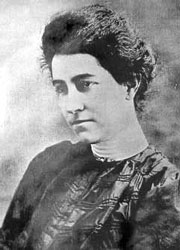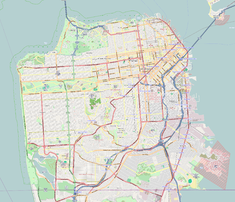Donaldina Cameron House
| Donaldina Cameron House | |
|---|---|
 | |
| Location | 920 Sacramento Street, San Francisco, California, U.S. |
| Coordinates | 37°47′36″N 122°24′31″W / 37.793467°N 122.408552°W |
| Founded | 1876 |
| Built | 1908 |
| Architect | Julia Morgan |
| Designated | October 10, 1971[1] |
| Reference no. | 44 |
The Donaldina Cameron House, formerly known as the Occidental Board Presbyterian Mission House and Chinese Presbyterian Mission House, is a historic building built in 1908, and located in Chinatown in San Francisco, California. The initial use of the building was as an early 20th-century safe house for Chinese girls and women.[2] Donaldina Cameron, the namesake for the building had served as the house director.[3] Due to the unsettling social history of the building, it is sometimes referred to as a haunted house. The building currently houses the Chinese community nonprofit, Cameron House.
It has been listed as a San Francisco Designated Landmark since October 10, 1971.[4][1]
Pre-history[edit]

Many Chinese emigrants came to California during the 1849 Gold Rush, they made up one-fifth of the population in four of the largest mining counties.[5][6][7] The Chinese were treated poorly, and they often worked low wage jobs in mines and on railroads. As a result, few Chinese women were able to join their partners in California, and the male Chinese population was disproportionately represented.
The Chinese Exclusion Act of 1882, began further limiting Chinese immigration. The Tongs exploited the situation by creating a human trafficking network and by setting up brothels in Chinatown.[8] The women brought from China were often sold as wives, prostitutes, and household slaves.[8]
In 1873, five women organized the Presbyterian Women's Occidental Board of Foreign Missions. The Occidental Board Presbyterian Mission House building was formed in 1876 in Chinatown in San Francisco, under the leadership of Margaret Culbertson (1834–1897).[3][9] It was established as a home for Chinese girls that were escaping abusive employment, or prostitution.[3][2] The first location of the organization was a wooden building located across the street at 933 Sacramento Street.[3]
Donaldina Cameron, joined the Mission House in 1895, where she taught sewing classes and worked alongside Culbertson.[10] Cameron started to serve as the house director starting in 1897, after the death of Culbertson.[3] Tien Fuh Wu worked as Cameron's aide,[11] and Samantha Knox Condit was a teacher at the organization.[12]
During the 1906 San Francisco earthquake and fires, the building was destroyed by the San Francisco Fire Department in hopes of creating a firebreak.[4]
History[edit]

The Occidental Board Presbyterian Mission House was rebuilt in 1908 under architect Julia Morgan, and changed it had locations to 920 Sacramento Street.[3] The new building was built using salvaged clinker bricks.[2] Girls and mui tsai would hide in the basement from their captures.
With the falling numbers of girls being rescued throughout the late-1930s and the Magnuson Act of 1943 (a repeal of the Chinese Exclusion Act), the needs of the community changed. Cameron retired in the late 1930s, and at this point the building was turned into a language school.[2]
Rev. F. S. "Dick" Wichman led the Donaldina Cameron House from 1947 to 1977.[2] Under Wichman, Cameron House expanded their youth programs and created mixed-sex and male classes.[2] Wichman was later accused of sexual abuse and misconduct in the 1990s.[2][13][14] Wichman had denied the allegations before his death.[15] Because of the statute of limitations, the San Francisco DA's office never prosecuted.[15][16] In 2004, the church's "Healing Task Force" released a final investigative report and found Wichman had abused and molested 18 males, including minors from the Cameron House and the Presbyterian Church in Chinatown.[13] The church has made efforts towards collective community healing, which included public acknowledgment of the crimes and an apology.[15]
Diana Ming Chan was the first Chinese social worker at Donaldina Cameron House.[17]
Rev. Harry Chuck led the Donaldina Cameron House starting in 1977.[16] Chuck had also worked for the Chinatown Coalition for Better Housing in the 1970s;[16] and he had documented on film Asian-American activism in the 1960s, which became part of the documentary film "Chinatown Rising" (2020).[18][19]
The Donaldina Cameron House building is considered haunted by some because of its unsettling social history.[2]
See also[edit]
- List of San Francisco Designated Landmarks
- American Presbyterian/Reformed Historic Sites Registry
- Tong Wars
- Tye Leung Schulze
References[edit]
- ^ a b "City of San Francisco Designated Landmarks" (PDF). City of San Francisco. Retrieved 2022-12-11.
- ^ a b c d e f g h Siler, Julia Flynn (2021-01-07). "The Safe Place That Became Unsafe". Alta Online. Retrieved 2022-12-11.
- ^ a b c d e f Richards, Rand (2002). Historic Walks in San Francisco: 18 Trails Through the City's Past. Heritage House Publishers. pp. 24–25. ISBN 978-1-879367-03-6.
- ^ a b "San Francisco Landmark #44: Donaldina Cameron House". noehill.com. Retrieved 2022-12-03.
- ^ "Chinese Immigrants and the Gold Rush". American Experience, PBS. Retrieved 2022-12-12.
- ^ "The Forgotten History of the Campaign to Purge Chinese from America". The New Yorker. 2021-04-22. Retrieved 2022-12-12.
- ^ "Asian Americans: Gold Rush Era to 1890s". Calisphere. Retrieved 2022-12-12.
- ^ a b Dillon, Richard H. The Hatchet Men: The Story of the Tong Wars in San Francisco's Chinatown. New York: Coward-McCann, 1962, p. 18
- ^ "She Gave Her Life to God; Death of Miss Margaret Culbertson of the Chinese Mission". California Digital Newspaper Collection. San Francisco Call. 1 August 1897. Retrieved 2022-12-12.
- ^ Sicherman, Barbara; Green, Carol Hurd (1980). Notable American Women: The Modern Period : a Biographical Dictionary. Harvard University Press. p. 131. ISBN 978-0-674-62733-8.
- ^ "The Child Slave Who Helped Rescue Thousands of Women in Chinatown". KQED. 21 May 2020. Retrieved 2023-01-19.
- ^ "Noted Mission Worker Dies After Long Career" San Francisco Examiner (August 20, 1912): 3. via Newspapers.com

- ^ a b Evinger, James S. (2022-06-06). "An argument to add "truth" to the proposed Rules of Discipline edits". The Presbyterian Outlook. Retrieved 2023-01-19.
- ^ Tate, Jeanne Choy (2013-05-21). Something Greater: Culture, Family, and Community as Living Story. Wipf and Stock Publishers. p. 166. ISBN 978-1-62189-875-7.
- ^ a b c Siler, Julia Flynn (2020-04-07). The White Devil's Daughters: The Women Who Fought Slavery in San Francisco's Chinatown. Knopf Doubleday Publishing Group. p. 341. ISBN 978-1-101-91029-0.
- ^ a b c Kurian, George Thomas; Lamport, Mark A. (2016-11-10). Encyclopedia of Christianity in the United States. Rowman & Littlefield. pp. 539–540. ISBN 978-1-4422-4432-0.
- ^ "Diana Ming Chan" (PDF). Chinese American Heroes. Archived from the original (PDF) on 2015-09-13. Retrieved 2023-01-19.
- ^ "Decades after footage was shot, son helps father finish film documenting history of Chinese American activism". Daily Pilot, Los Angeles Times. 2020-02-21. Retrieved 2023-01-19.
- ^ Johnson, G. Allen (May 21, 2022). "When San Francisco was threatened by a 'Plague at Golden Gate'". Datebook, The San Francisco Chronicle. Retrieved 2023-01-19.
External links[edit]
- Official website for the Cameron House nonprofit


